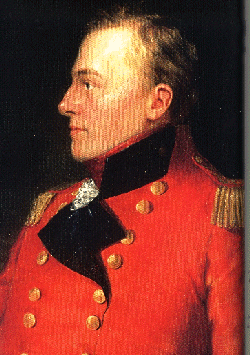
foreword | Historical Narratives | Resources | Links | Contact
REMEMBER BROCK, PART 2
"History is a description of things as they are or have been."
What booteth it to have been rich alive?
What to be great? What to be glorious?
If after death no token doth survive
Of former being in this mortal house,
But sleeps in dust, dead and inglorious?
 |
|
Sir Isaac Brock |
The provincial Legislature of Upper Canada was determined that Major-General Sir Isaac Brock should be remembered in Upper Canada's "mortal house." Failure to ensure this "would do injustice to our late, great, truly illustrious president, Isaac Brock, who has endeared himself to us by his able, virtuous, and disinterested administration of this government, and by the zeal, military talent and bravery which characterized and marked his conduct in the field."
In an address dated 6th of March, 1813, to His Royal Highness the Prince Regent, who was ruling in the temporary absence of his father, George III, the 'Commons' of Upper Canada petitioned the Prince to recognize Brock in a most unusual way. "We deeply lament our inability to bestow on him any other reward than praise, and beg to suggest a grant to his family of a portion of His Majesty's most valuable wastelands in this province." The Prince approved their petition, and the thanks of a grateful nation was extended to Brock by bestowing upon the male members of his family, property in the province of Upper Canada.
The four surviving brothers were Daniel of Guernsey, and William, Irving and Savery of the City of London. Brock's two married sisters did not share in this "munificent grant," perhaps, because the Legislature wanted to perpetuate with
In Their Own Words"This splendid gift of unfading remembrance of a grateful people, the connection between Upper Canada and the name of Brock."
It is doubtful that any reward for services rendered would have pleased Brock more, for his extensive correspondence to his siblings clearly demonstrated that he was devoted to his family. In the face of intense pressures as both military and administrative head of the province during its most critical period, Brock always found time to fret about the family's fortunes and their problems back home, and to urge his brothers to love and support one another.
The land grant bestowed by the Legislature was for 12,000 acres, which Brock's brothers were to hold as tenants in common forever. The properties were situated in various parts of the province, the largest parcel, seven thousand acres, being located in East and West Flamborough Townships, which are in Wentworth County. Twelve hundred acres were located, appropriately, in Brock Township on Lake Simcoe in Ontario County. Three thousand acres were in Monaghan Township on Rice Lake in Peterborough County, and the last 800 acres were in Murray Township along Lake Ontario in Northumberland County. Numerous errors occurred in the description of "all these several lots, parcels of land and hereditaments," as a result of which several lots purporting to be mutually conveyed were, in fact, not granted.
Savery Brock, who toured Canada and parts of the United States in 1817 was overjoyed with this generous gift, and eagerly visited the various sites during his trip to Upper Canada in August of that year. He astutely informed his brothers that the Flamborough acreage was
In His Own Words"at the head of Lake Ontario about twelve miles from its margin with not a house within 8 or 9 miles of it. This is the best of our land."
Savery was very proud to discover wherever he went in the province, that Isaac's cherished memory "lived in the hearts of the people." He visited Isaac's grave at Fort George, where he had the good fortune to dine on August 16th, the fifth anniversary of Brock's capture of Fort Detroit, with 49 guests. Brock's regiment was the 49th.
None of the Brock men had any male children, and the brothers' properties were inherited by their daughters. Daniel's went to his only child, Sophia Brock, a spinster. William bequeathed his properties to his wife, Sarah Maria, who left the land in turn to her daughters, Mary Brock Pottinger and Julien Jane Pottinger. Savery's two daughters, Rosa Barnes and Betsey de Jersey Carey, were co-heiresses. None of the Brock family ever lived on these lands and over a period of time they were all sold.
Economic difficulties had always plagued the Brock brothers. The financial mainstay of the family was businessman, William, who purchased a number of Isaac's military commissions. William had intended these purchases as gifts, but unbeknownst to him the monies were listed as debts in the company's books. While William's business interests flourished, no one worried about these outstanding loans, but as Napoleon's embargoes on British goods flowing into Europe began to affect trade negatively, all debts were called in and the Brock brothers found themselves in financial difficulties. The brothers were more than grateful, therefore, when Isaac's fame brought them largesse as well as land, when the British parliament granted each brother a life pension of two hundred pounds.
Brock's brothers all died young. Savery, the last to go, died in 1847 of "a disease of the brain."
Copyright © 2013 Website Administrator